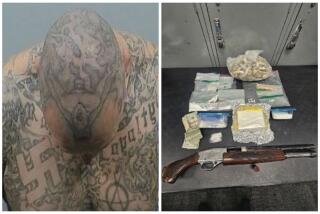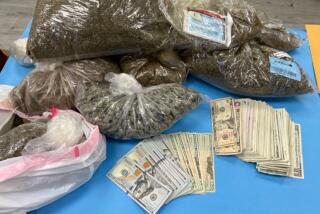14 Indicted in Crackdown on Asian Crime Ring
In the first use of federal racketeering laws against an Asian organized crime ring in California, 14 people were indicted Friday on charges of running a prostitution ring and engaging in “slave trafficking,” drug trafficking, credit card fraud and money laundering.
The 38-count indictment handed up Friday provides a detailed and rare window into what authorities say is the world of Asian gangsters, whom they consider among the most ruthless, efficient and dangerous criminals operating today.
Federal authorities arrested the alleged leader of the San Gabriel Valley-based crime syndicate, Hung The “Kevin” Dong, 37, who is known to his underlings as “Big Brother.”
Eight others also were arrested, including Chooi Lu, Dong’s 28-year-old girlfriend, who authorities said helped him manage the prostitution business and helped oversee the transportation of women to and from the ring’s many brothels scattered around Southern California and Las Vegas.
Also taken into custody were Tan Minh Ly, allegedly a top weapons trafficker and narcotics sales manager of the organization also known as “Payday,” and David Huang Wei, who helped run the prostitution and counterfeit credit operations, authorities said.
Five fugitives were being sought, including Dong An, 27, an associate wanted on murder charges related to the organization’s activities, according to the indictment.
“This was a sophisticated criminal enterprise, as sophisticated as they get,” said James V. DeSarno Jr., who heads the FBI’s Southern California operations.
“We see violence, we see prostitution, we see money laundering--not unlike what we saw in the early days of organized crime,” when Italian crime syndicates had a stranglehold on their ethnic communities in New York and elsewhere.
Those crime families have been on the wane for decades, and have slowly been replaced by other, more ruthless and efficient crime syndicates, including Asian gangs such as the one Dong is accused of heading.
The arrests come on the heels of an FBI crackdown on Asian organized crime in Orange County’s Little Saigon. Agents there said they hope to make a dent in racketeering and drug outfits that have flourished since the 1970s.
According to Friday’s indictment, Dong’s syndicate had a corporate flow chart, with high-ranking executives overseeing multi-state operations while “soldiers” and enforcers carried out their business.
Importation of Women for Slavery Alleged
Two alleged associates of the group, in fact, are suspected of carrying out murders in furtherance of the group’s criminal enterprises.
Dong and his syndicate also were accused of importing women from Malaysia, Mexico and elsewhere into the United States and having them work as prostitutes “in what amounted to white slave trading,” authorities said.
The prostitutes would work in one brothel for several months and then be moved to another, and then another, by soldiers in the enterprise--a federal crime prosecutable under what is known as the White Slavery Act, DeSarno and others said at a news conference held to announce the arrests and indictments.
Dong’s organization also is alleged to have engaged in a wide array of other criminal activities for an unknown period of time. Gang members committed armed robberies, assaults and home invasions and trafficked in cocaine, the club-scene drug Ecstasy and counterfeit credit cards, authorities said.
It is not unusual for organized crime cells to engage in such a wide array of criminal activities. But in this case, authorities contend that they were able to use wiretaps, undercover operatives and other means to show that the group operated almost like a corporation, with an organized management system.
And the operation was growing in size and influence, DeSarno said.
For those reasons, authorities chose to prosecute Dong and his alleged associates as an “ongoing criminal enterprise,” using federal statutes within the Racketeer Influenced and Corrupt Organizations Act, or RICO, that carry far more significant prison terms on conviction than most white-collar crime statutes.
The RICO statutes, in fact, were created to smash criminal syndicates, and they have been an effective weapon against traditional organized crime families for decades. Recently, they were used against the Mexican Mafia and the 18th Street gang, two powerful Latino gangs in Southern California.
But the RICO statutes have never been used against Asian organized crime rings, in part because it has been hard to prove that the elusive groups operated at a high level of cooperation, said Special Agent Kerry Smith, who heads one of the FBI’s local Asian Organized Crime Units and is based in West Covina.
“That’s the goal,” said DeSarno, “to use racketeering statutes to dismantle this organization.”
None of those arrested could be reached for comment, and authorities did not provide the names of their attorneys.
More to Read
Sign up for Essential California
The most important California stories and recommendations in your inbox every morning.
You may occasionally receive promotional content from the Los Angeles Times.









